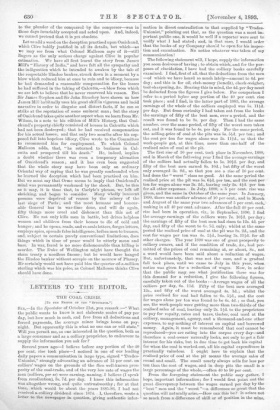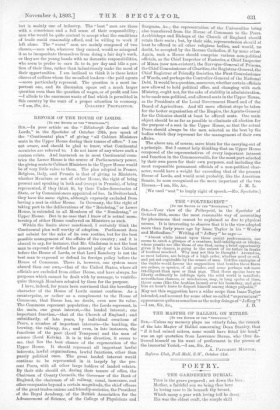LETTERS TO THE EDITOR.
THE COAL CRISIS.
[TO THE EDITOR OF TIIR EFECTATOR.j
Sin,-In the Spectator of October 21st, you remark :-" What the public wants to know is not elaborate scales of pay per day, but how much in cash, and free from all deductions and forced payments, the average miner brings home on pay. night. But apparently this is what no one can or will state." Will you permit me, as one interested in the question, both as a large consumer and as a colliery proprietor, to endeavour to supply the information you ask for P Several years ago-I believe before any portion of the 40 per cent. rise took place-I noticed in one of our leading daily papers a communication in large type, signed " Trades- Unionist," strongly advocating an advance of 15 per cent. on colliers' wages on the grounds of the then well-known pros- perity of the coal-trade, and of the very low rate of wages the men (colliers, per se) were earning, naming, I believe (I speak from recollection), 3s. 7d. per day. I knew this information was altogether wrong, and quite untrustworthy ; for at that time, which would be about the years 1885.86, I had not received a colliery dividend since 1874. I, therefore, wrote a letter to the newspaper in question, giving authentic infor- mation in direct contradiction to that supplied by "Trades- Unionist," pointing out that, as the question was a most im- portant public one, it would be well if a reporter were sent to verify what I had stated; and, in that case, I would order that the books of my Company should he open for his inspec- tion and examination. No notice whatever was taken of my comtuunioation !
The following statement will, I hope, supply the information you seem desirous of having ; to obtain which, and for the pur- poses of elucidation, I have had the colliery books carefully examined. I find, first of all, that the deductions from the men -of which we have heard so much lately-amount to 4d. per day ; and this is for oil, club-money (benefit), check-weigher,. tool-sharpening, &c. Bearing this in mind, the 4d. per day must be deducted from the figures I give below. For comparison I refer to a period before any portion of the 40 per cent. rise took place ; and I find, in the latter part of 1885, the average earnings of the whole of the colliers employed was 5s. lltd.. per day. But from curiosity I had taken out from the books the earnings of fifty of the best men, over a period, and the- result was found to be 8s. per day. Then I had the same number, over the same period, of fifty of the worst men taken out, and it was found to be 4s. per day. For the same period, the selling-price of coal at the pits was 5s. 54d. per ton ; and the cost per ton for wages alone was 2s. Did., so that the work-people got, at this time, more than one-half of the realised sales of coal at the pit.
The first rise of 10 per cent. took place in November, 1888, and in March of the following year I find the average earnings of the colliers had actually fallen to 5s. 10111. per day, and fifty of the beat men earned 8s. 10d.; but fifty of the worst only averaged 3s. 9d., so that you see a rise of 10 per cent. had done the " worst " class no good. At the same period the realised price at the pit was 5s. 60. per ton, and the cost per ton for wages alone was 3s. 2d., leaving only 2s. W. per ton for all other expenses. In July, 1889, a 5 per cent. rise was given, and the same in October of the same year. In January,. 1890, there was another advance of 10 per cent., and in March and August of the same year two advances of 5 per cent. each,. making in all 40 per cent. advance. After the full 40 per cent. rise had been in operation, viz., in September, 1890, I find the average earnings of the colliers were 7s. 10id. per day; the earnings of fifty of the best men had risen to 12s. 4d. per day, and fifty of the worst to 4s. 7d. only; whilst'at the same period the realised price of coal at the pit was 8s. 2d., and the cost for wages per ton was 4s. 2id., leaving 3s. lltd. for all other charges. The year 1890 was one of great prosperity to colliery owners, and if the condition of trade, &c., had per- mitted of the prices of coal remaining at, or about, 8s., not a word would have been said about a reduction of wages. But, unfortunately, that was not the case, and a gradual fall took place, until we came to July in this year, when• notice was given for a reduction of wages. Now, in order that the public may see what justification there was for this demand for a reduction, I give the following figures, carefully taken out of the books :-Average wages of all the colliers per day, 6s. 11d. Fifty of the best men averaged 128., and fifty of the worst averaged 4s. ld. ; whilst the price realised for coal had fallen to 6s. 50., and the cost for wages alone per ton was found to be 4s. 4d. ; so that, you see, the work-people were getting more than two-thirds of the realised sales of coal, leaving only 2s. lid. to the proprietors to pay for royalty, rates and taxes, timber, coal used at the colliery, management, agency, and a thousand-and-one other expenses, to say nothing of interest on capital and borrowed money. Again, it must be remembered that coal cannot be- reproduced-you are eating into the corpus every day-and therefore a coal-owner naturally looks, not only to get a fair interest for his risks, but in due time to get back his capital for when the coal is worked-out, all his capital expenditure is practically valueless. I ought here to explain that the realised price of coal at the pit means the average sales of round and small. The small nearly always sells for less per ton than the cost of wages, and in deep pits the small is a large percentage of the whole,-often 40 to 50 per cent.
From the foregoing statement the public may gather, I hope, important information; for I would first point out the great discrepancy between the wages earned per day by the " best " men and the " worst "-a difference so great that the question will naturally arise,-How can this be P It arises not so much from a difference of skill or of position in the mine, but is mainly one of industry. The " best " men are those with a conscience and a full sense of their responsibility ; men who would be quite content to accept what the conditions of trade could reasonably afford, and be willing to work if left alone. The " worst " men are mainly composed of two classes,—men who, whatever they earned, would so misspend it as to incapacitate themselves from doing a fair day's work, or they are the young hands with no domestic responsibilities, who seem to prefer to earn 3s. to 4s. per day and idle a por- tion of their time, rather than industriously make the most of their opportunities. I am inclined to think it is these latter classes of colliers whom the so-called leaders—the paid agents —more particularly represent. The question is a most im- portant one, and its discussion opens out a much larger question even than the question of wages, or of profit and loss —I allude to the enormous waste of fuel which is permitted in this country by the want of a proper attention to economy.





















































 Previous page
Previous page